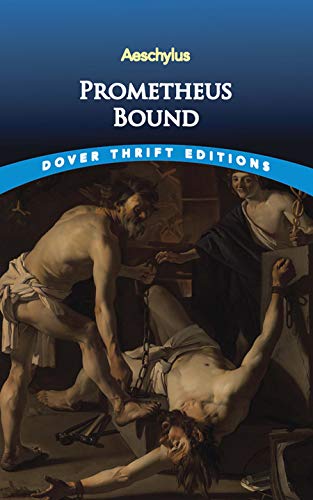Synopsis
In Greek legend, Prometheus was the Titan who, against the will of Zeus, stole fire from the gods for the benefit of man. His terrible punishment by Zeus, and his continuing defiance of Zeus in the face of that punishment, remain universal symbols of man's vulnerability in any struggle with the gods.
In the epic drama Prometheus Bound, Aeschylus (c. 525-456 BC), first of the three great Greek tragic poets, re-creates this legendary conflict between rebellious subject and vengeful god. Chained for eternity to a barren rock, his flesh repeatedly torn by a ravaging eagle, Prometheus defends his championship of mankind, rejoicing in the many gifts of language and learning he has given man despite Zeus's cruel opposition.
Inspired by Prometheus's spirit, Aeschylus reaches beyond the myth to create one of literature's most gripping portrayals of man's inhumanity to man. How Prometheus clings to his convictions and braves his harsh fate give Prometheus Bound its extraordinary vitality and appeal. For over 2,000 years, this masterpiece of drama has held audiences enthralled. It is reprinted here in its entirety from the translation by George Thomson.
Présentation de l'éditeur
The myth of fire stolen from the gods appears in many pre-industrial societies. In Greek culture Prometheus the fire-stealer figures prominently in the poems of Hesiod, but in Prometheus Bound Hesiod's morality tale has been transformed into a drama of tragic tone and proportions. In the introduction, Mark Griffith examines how the dramatist has achieved this transformation, looking at the play from all angles - plot and characters, dramatic technique, style and metre. He includes a short section on the production of the play and on the questions of authenticity and date. The commentary guides the reader through problems of language, metre and content. An important feature of this volume is the appendix, which gathers together the existing fragments of the other two plays in the supposed Prometheus trilogy, quoting them in full in the original language and in translation, with short accompanying commentary. This is suitable for undergraduates and students in the upper forms of schools. It also deserves the serious attention of scholars. The introduction requires no knowledge of Greek and will interest students of drama and literature in other cultures too.
Les informations fournies dans la section « A propos du livre » peuvent faire référence à une autre édition de ce titre.
